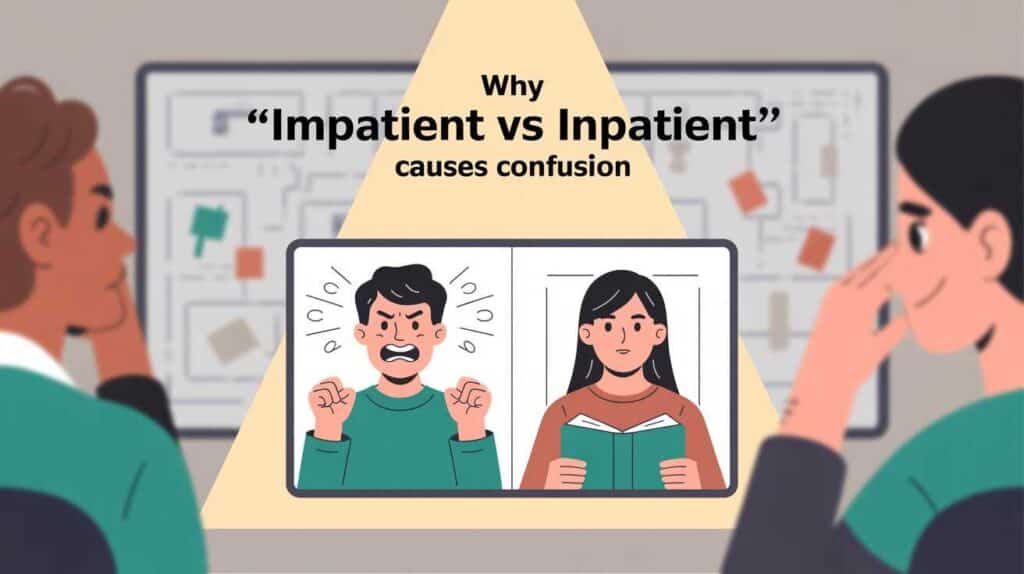Ever stumbled on impatient vs inpatient and wondered which one fits your sentence? You’re not alone. These two words sound similar, but they carry completely different meanings. One deals with emotions and behavior, while the other belongs to the world of hospitals and healthcare. Mixing them up can lead to confusing or even embarrassing mistakes, especially in professional or academic writing.
In this guide, we’ll unpack their differences, explore how they’re used, and show you smart ways to remember which is which — all while improving your language confidence, grammar skills, and writing clarity.
Why “Impatient vs Inpatient” Causes Confusion

The confusion often arises because the two words are homophones they sound the same when spoken, even though they differ in meaning and usage. This mix-up is a classic example of homophone mistakes that can easily slip into your writing.
In English grammar, homophones like impatient and inpatient cause trouble due to spelling errors, grammar issues, and writing mistakes. Their sound-alike words nature leads to language confusion and common homophones slipping into everyday communication.
What Does “Impatient” Mean?
Impatient describes someone who finds it hard to wait calmly for something to happen. It often shows a sense of restlessness, frustration, or anxiety when progress feels slow.
In daily life, an impatient person may tap their foot, sigh, or interrupt conversations. This emotional tone highlights a struggle with self-control and the desire for immediate results.
Definition and Emotional Context
Impatient describes a feeling of restlessness, frustration, or irritation when something takes too long. It’s tied to emotions, not medicine. You might feel impatient when waiting in a long line or when someone takes forever to reply to a message.
In short, impatient expresses emotional impatience — that inner push for things to move faster. It’s an adjective that reflects one’s feelings, emotional tone, or attitude toward delay or inconvenience.
Examples of “Impatient” in Sentences
- She grew impatient while waiting for the doctor to arrive.
- Don’t be impatient; good things take time.
- He’s too impatient to listen to the full explanation.
Each of these shows how the word fits emotional or behavioral contexts — nothing related to hospitals or medical care.
What Does “Inpatient” Mean?
Inpatient refers to a person who stays in a hospital or medical facility overnight or for an extended period to receive treatment or care. It’s a medical term used in healthcare to distinguish those admitted for observation, surgery, or recovery from those treated and released the same day. Inpatient care usually involves round-the-clock monitoring, medical supervision, and detailed documentation in hospital records.
Definition and Medical Context
On the other hand, inpatient belongs to the clinical context. It refers to a hospital patient who stays overnight or longer to receive medical treatment. For example, someone admitted to a hospital for surgery is called an inpatient, not a visitor or outpatient.
In healthcare, inpatient care involves continuous supervision, specialized treatment, and often an overnight stay — marking it distinct from outpatient visits where patients go home the same day.
Examples of “Inpatient” in Sentences
- The hospital expanded its inpatient facilities to serve more patients.
- After surgery, she remained an inpatient for three nights.
- Inpatient care is generally more expensive than outpatient care.
Where Both Words Come From
Both words trace their roots to Latin but evolved in different directions. Here’s a quick visual etymology table for a clearer look:
| Word | Origin | Root Meaning | Modern Meaning |
|---|---|---|---|
| Impatient | Latin im- (“not”) + patiens (“bearing, enduring”) | “Not able to endure” | Restless or easily irritated |
| Inpatient | Latin in- (“in”) + patior (“to suffer”) | “Suffering within” | A hospital patient admitted for care |
Despite sounding alike, their origins show they diverged — one emotional, one medical.
READ MORE >>> Herd vs Hurd – Meaning, Spelling, and Correct Usage Explained
Key Differences Between “Impatient” and “Inpatient”
Here’s a quick comparison table to help you distinguish the two instantly:
| Feature | Impatient | Inpatient |
|---|---|---|
| Part of Speech | Adjective | Noun |
| Context | Emotional / Behavioral | Medical / Clinical |
| Meaning | Restless, unable to wait | Hospital patient under care |
| Example | “She’s impatient with delays.” | “He’s an inpatient recovering from surgery.” |
| Tone | Expresses feelings | Refers to treatment status |
| Common Error | Writing “inpatient” for “impatient” in casual writing | Writing “impatient” instead of “inpatient” in hospital forms |
Why These Words Get Mixed Up
The pronunciation of both words is nearly identical, causing pronunciation errors and language pitfalls in speech and writing. Many learners make spelling mistakes or typing errors when trying to spell them quickly.
Such vocabulary mix-ups are common in English, especially with tricky expressions and confusing terms that share similar sounds but have totally different meanings.
How to Remember the Difference
Here’s a simple mnemonic trick:
- Impatient → Think “I’m patient… not!” (Emotion-related)
- Inpatient → Think “IN the hospital.” (Medical-related)
This quick memory aid and recall technique can save you from frequent errors in writing contexts or professional communication.
Usage in Real-World Contexts
In real life, the words “impatient” and “inpatient” appear in very different situations. Impatient reflects emotions like frustration or restlessness when waiting.
Inpatient, however, belongs to the medical world, describing someone staying in a hospital for treatment. Knowing how each word fits its context helps you communicate clearly and confidently.
Impatient in Everyday Life
In workplace emails, essays, and professional writing, using “impatient” shows emotional tone and attitude. It reflects how people feel or react in communication contexts.
Example:
“The manager grew impatient with the team’s slow response.”
This shows feelings, frustration, and restlessness — key emotional markers.
Inpatient in Healthcare Settings
In medical documentation or hospital environments, precision is vital. Using “inpatient” correctly ensures document clarity and avoids grammar mistakes that could confuse readers.
Example:
“The inpatient received continuous care during her recovery.”
Here, the word has a purely clinical context, tied to patient care and hospital admission.
Common Mistakes and How to Fix Them
Many writers make habitual errors when typing or proofreading. Here are some common ones:
- Writing “inpatient” instead of “impatient” in emotional contexts.
- Mixing up spelling errors and word usage in writing faults.
- Using “impatient” in medical writing where “inpatient” is correct.
Tip: Always do a quick grammar check or context examination during your edit process to ensure your word matches the sentence meaning.
Proofreading Strategies & Writing Tips
- Use online grammar checkers for spelling errors.
- Read your sentence aloud — if it sounds emotional, it’s likely impatient; if medical, it’s inpatient.
- Keep a word list of common homophones to avoid writing errors.
- Double-check context usage before finalizing documents or essays.
These writing review and error correction habits build language confidence, improve communication, and sharpen your English proficiency.
Frequently Asked Questions
Is it inpatient or impatient?
It depends on context. Use impatient for feelings of frustration and inpatient for a hospital patient staying overnight.
What is the meaning of impatient?
Impatient means feeling restless or annoyed when waiting too long. It’s tied to emotional impatience, not hospitals.
What is the meaning of inpatient?
Inpatient refers to a hospital patient who stays overnight for medical treatment or inpatient care.
Why are “impatient” and “inpatient” often confused?
They sound the same — a case of homophone mistakes. Their identical pronunciation causes language confusion and misspellings.
Conclusion
Understanding the difference between impatient vs inpatient strengthens your English grammar, boosts language proficiency, and sharpens communication confidence.
Whether you’re crafting a professional report, filling medical forms, or refining your writing style, remembering this small distinction keeps your message crystal clear.

Arabella Rose, admin of [synatax veins], makes grammar simple and fun! With expert tips and clear advice, she helps you write with confidence and clarity. ✍️📚

